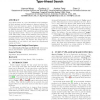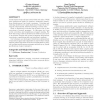551 search results - page 18 / 111 » Semantic knowledge in word completion |
SIGIR
2009
ACM
14 years 2 months ago
2009
ACM
Type-ahead search is a new information-access paradigm, in which systems can find answers to keyword queries “onthe-fly” as a user types in a query. It improves traditional ...
DAS
2008
Springer
13 years 9 months ago
2008
Springer
In this paper a complete OCR methodology for recognizing historical documents, either printed or handwritten without any knowledge of the font, is presented. This methodology cons...
FLAIRS
2009
13 years 5 months ago
2009
1 Two sentences are paraphrases if their meanings are equivalent but their words and syntax are different. Paraphrasing can be used to aid comprehension, stimulate prior knowledge,...
WCRE
2006
IEEE
14 years 1 months ago
2006
IEEE
Jointly deployed aspects may interact with each other. While some interactions might be intended, unintended interactions (interferences) can break a program. Detecting and resolv...
CORR
2010
Springer
13 years 7 months ago
2010
Springer
Justification logics are epistemic logics that explicitly include justifications for the agents' knowledge. We develop a multi-agent justification logic with evidence terms fo...


